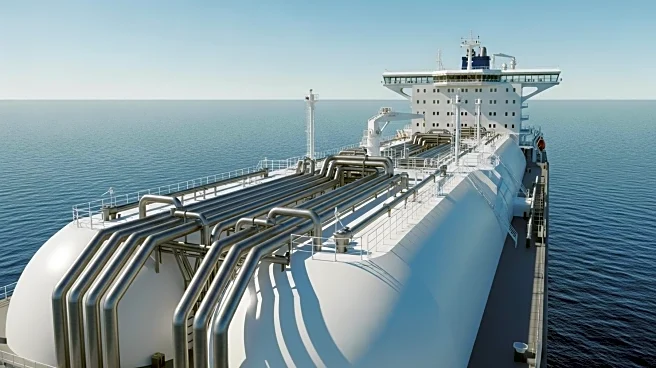What is the story about?
What's Happening?
The American Bureau of Shipping (ABS) has granted two approvals in principle for advanced cargo handling systems developed by HD Korea Shipbuilding & Offshore Engineering (HD KSOE). These systems are designed for liquefied natural gas (LNG) carriers and ethane carriers. The subcooling refrigeration system, a key advancement for LNG carriers, uses a mixed refrigerant of both gas and liquid, enhancing refrigeration efficiency by over 10 percent compared to conventional systems. This system supercools LNG to temperatures below -170°C, reducing the risk of boil-off gas and maintaining cargo integrity during transit. Additionally, HD KSOE has developed an advanced cargo handling and re-liquefaction system for ethane carriers, adaptable to various vessel capacities, which aims to improve operational efficiency and mitigate risks associated with ethane transportation.
Why It's Important?
The approval of these systems by ABS is significant for the shipbuilding industry, particularly in the transportation of LNG and ethane, which is expected to grow in the coming years. The enhanced efficiency and safety of these systems support the industry's need for reliable and effective cargo management solutions. By advancing these technologies, HD KSOE is contributing to the localization of core technologies in shipbuilding, strengthening global competitiveness. This development is crucial for maintaining safe and efficient operations in the maritime transport sector, which is vital for global energy supply chains.
What's Next?
HD KSOE plans to continue advancing the development of fundamental technologies to further bolster the shipbuilding sector's global competitiveness. The collaboration between ABS and HD KSOE, initiated through a memorandum of understanding in late 2024, will likely lead to further innovations and certifications of next-generation ship systems. As the demand for LNG and ethane transportation grows, these advancements will play a critical role in meeting industry needs and ensuring safe and efficient maritime operations.
Beyond the Headlines
The development of these advanced systems highlights the importance of technological innovation in addressing environmental and operational challenges in the maritime industry. By improving refrigeration efficiency and cargo handling, these systems contribute to reducing emissions and enhancing the sustainability of maritime transport. This aligns with broader industry efforts to minimize environmental impact and improve energy efficiency in shipping.















